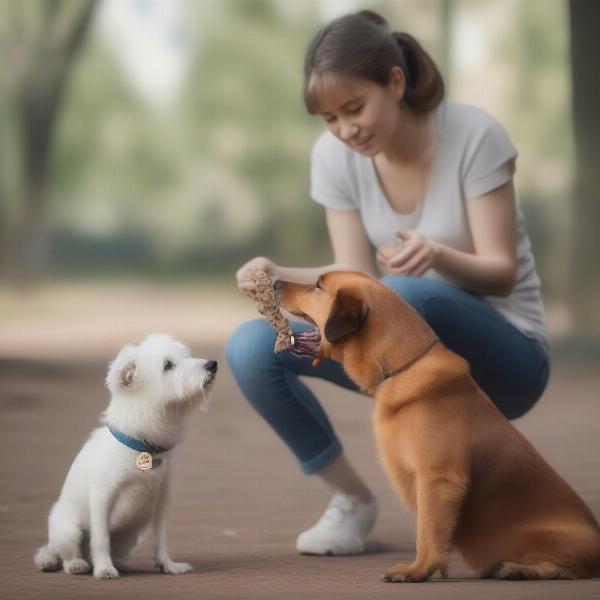Dog barking at other dogs is a common occurrence, but understanding the underlying reasons and knowing how to manage it can make walks and social interactions much more enjoyable for both you and your canine companion. This behavior can stem from a variety of motivations, including excitement, fear, territoriality, or frustration. Addressing this behavior requires patience, consistency, and a tailored approach based on your dog’s individual needs.
Decoding the Barks: Why Does My Dog Bark at Other Dogs?
Dogs communicate primarily through body language and vocalizations, and barking is a key element of their vocal repertoire. When your dog barks at another dog, it’s an attempt to communicate something, and deciphering that message is the first step towards managing the behavior. Is your dog wagging its tail while barking? This could indicate excitement or playfulness. A tucked tail and flattened ears, on the other hand, suggest fear or anxiety. A stiff posture and direct stare may indicate territoriality or aggression.
Excitement and Playfulness
Sometimes, a dog’s barking is simply an expression of overflowing enthusiasm. They might be eager to greet and play with the other dog, and their barks are a way of saying “Hello! Let’s be friends!” This type of barking is often accompanied by playful body language, such as a wagging tail, bouncy movements, and play bows.
Fear and Anxiety
For some dogs, encountering other dogs can be a source of fear or anxiety. Their barking may be a defensive mechanism, a way of saying “Stay away!” This type of barking is often accompanied by fearful body language, such as a tucked tail, flattened ears, lip licking, and yawning.
Territoriality and Aggression
Some dogs exhibit territorial behavior and may bark at other dogs to protect their space or resources. This barking is often accompanied by aggressive body language, such as a stiff posture, raised hackles, a direct stare, and growling.
Managing the Barking: Effective Strategies
Once you understand the reasons behind your dog’s barking, you can implement strategies to manage the behavior. Remember, consistency and patience are key to success.
Positive Reinforcement Training
Rewarding your dog for calm behavior around other dogs is a highly effective method. When you see another dog approaching, redirect your dog’s attention to you and reward them with a treat or praise when they remain calm and quiet.
Desensitization and Counterconditioning
If your dog barks out of fear or anxiety, desensitization and counterconditioning can help. Gradually expose your dog to other dogs at a distance where they don’t bark, and pair the presence of other dogs with positive experiences, such as treats or toys.
Socialization
Early socialization is crucial for developing appropriate social skills in dogs. Expose your puppy to a variety of dogs and environments to help them learn how to interact appropriately with other canines.
 Dog Training with Positive Reinforcement
Dog Training with Positive Reinforcement
Seek Professional Help
If you’re struggling to manage your dog’s barking, don’t hesitate to seek professional help. A certified dog trainer or veterinary behaviorist can assess your dog’s behavior and develop a tailored training plan.
“Addressing dog barking at other dogs requires a multifaceted approach,” says Dr. Emily Carter, a certified veterinary behaviorist. “Understanding the underlying emotions driving the behavior is crucial for developing an effective management plan.”
Creating a Positive Experience: Tips for Dog Encounters
Making dog encounters positive experiences for your dog can go a long way in reducing barking and promoting healthy social interactions.
- Choose the Right Environment: Opt for calm, controlled environments for dog interactions, avoiding crowded or stressful situations.
- Gradual Introductions: Allow dogs to greet each other gradually, starting at a distance and slowly decreasing the space between them.
- Supervise Interactions: Always supervise interactions between dogs, especially if one or both dogs have a history of barking or reactivity.
“Socialization is not just about letting dogs play together,” explains Jane Miller, a certified dog trainer. “It’s about teaching them how to interact appropriately with other dogs in different situations.”
Conclusion
Dog barking at other dogs is a complex behavior with various underlying causes. By understanding these causes and implementing appropriate training and management techniques, you can help your dog feel more comfortable and confident around other canines, making walks and social interactions more enjoyable for both of you. Remember, patience and consistency are key to success.
FAQ
- Why does my dog bark excessively at other dogs? Excessive barking can stem from fear, anxiety, excitement, territoriality, or learned behavior.
- How can I stop my dog from barking at other dogs on walks? Positive reinforcement training, desensitization, and counterconditioning can be effective.
- Is it normal for my dog to bark at some dogs but not others? Yes, dogs may react differently based on the other dog’s size, breed, behavior, or previous experiences.
- What should I do if my dog barks aggressively at other dogs? Consult with a certified dog trainer or veterinary behaviorist for professional guidance.
- Can early socialization prevent my dog from barking at other dogs? Yes, early and proper socialization plays a crucial role in developing appropriate social skills in dogs.
- What are some signs my dog is barking out of fear? Fearful barking is often accompanied by tucked tail, flattened ears, lip licking, and yawning.
- Are there any tools or products that can help stop my dog from barking at other dogs? While tools like spray collars or ultrasonic devices exist, it’s essential to address the underlying cause of the barking through training.
Related Articles
ILM Dog is your trusted resource for expert advice on dog care and training. We provide a comprehensive range of resources covering breed selection, health and medical care, training and behavior, nutrition, grooming, and much more. We empower dog owners with the knowledge and tools to provide the best possible care for their canine companions. Contact us for expert advice on dog health, training, behavior, nutrition and product recommendations. Email: [email protected]. Phone: +44 20-3965-8624. Visit ILM Dog today!